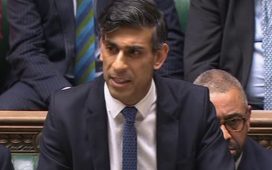The government faces anger after leaving renters and zero-hour workers out of a £350bn coronavirus crisis package – despite Boris Johnson vowing to support the whole economy.
MPs, trade bodies and unions have called for more support sooner than planned, as the UK’s death toll reached 71 and Brits are encouraged to remain at home wherever possible – putting many jobs at risk.
The measures, revealed yesterday by Chancellor Rishi Sunak and Prime Minister Boris Johnson, include mortgage payment freezes for those in financial difficulty, £330bn in loans and £20bn in other support for businesses.
But many critics believe the rescue package has ignored renters, the self-employed and the redundant, as well as those in insecure jobs.
Last night Mr Sunak said extra measures would be announced in the “coming days” to help protect people who rent – but he did not say what they were.
The Chancellor told MPs: “The biggest fixed costs that many families face will be their rent payment and it is right that we have regard to that.

(Image: PA)
“The Housing Secretary will in the coming days be making a statement with further measures to protect renters through these difficult times.”
Chancellor Rishi Sunak described the interventions in the economy as “a scale almost unimaginable a few weeks ago”. The Tory said: “This is not a time for ideology and orthodoxy. This is time to be bold. For courage.”
But Labour leader Jeremy Corbyn said: “The government has announced a mortgage holiday for homeowners but it must suspend rents too.
“Millions of people rent in the UK. Suspend rents. Ban evictions. Now.”
£350 billion in business handouts – or 15 percent of GDP – will be lent or give as aid to help firms across the UK pay for supplies, overheads and staff wages – while rates relief in the hospitality sector and funding grants for small businesses will also be available.
Mortgage lenders, meanwhile, have agreed to afford certain people a three-month ‘holiday’ depending on how badly they have been impacted by Covid-19.
Travel bans have swept the world, with many countries closing their borders, leaving planes grounded – and the Government is considering support for the resultant struggling airlines.

(Image: PA)
Labour chairwoman of the Commons Business Committee, Rachel Reeves, has slammed the Government over its ‘failure’ to take note of Brits already on statutory sick pay, self-isolating or without work.
While unions have questioned the lack of measures aimed at freelancers and temporary workers, and some politicians want more support for renters.
Mr Sunak has, however, promised more measures in the next few days.
Labour leader Jeremy Corbyn wants the Tories to suspend home rental fees and ban evictions of tenants during the crisis, ahead of Mr Johnson’s appearance at Prime Minister’s Questions at midday.
Many firms and trade bodies have welcomed the measures but admitted they had yet to properly review all the details.

(Image: Getty Images)
Adam Marshall, chief executive of the British Chambers of Commerce, said the level of grants and loans would be great for smaller enterprises, but said the money needs to get out “quickly”.
Paul Johnson, director of the Institute of Fiscal Studies, believes the business rates holiday is unlikely to allow bosses to target saving jobs.
He said instead employer national insurance contributions or delaying bumping up the living wage as well as increasing Universal Credit Allowances could be needed.
But Mark Hodgkinson, Chief Executive of disability equality charity Scope, added: “The Government needs to consider the UK’s 14 million disabled people in every decision it makes in tackling the coronavirus crisis.
“There is still far too much ambiguity about what disabled people should and should not do and what will be put in place to support them if they need to self-isolate or take time off.
“This crisis is likely to hit disabled people especially hard. Already facing extra costs of £583 a month, potential drops in income could mean many will struggle to have enough money to get by and protect themselves and their health.”













